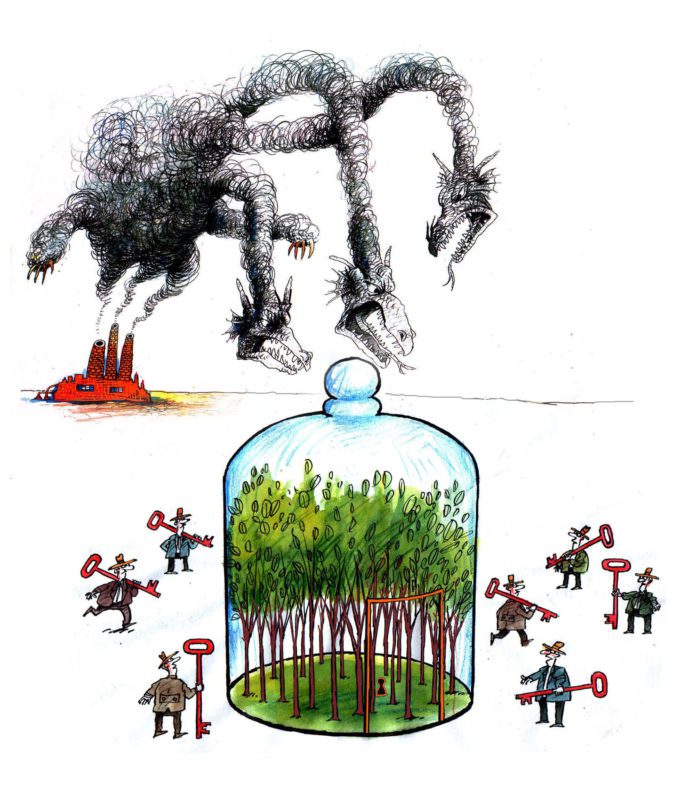BY BOB DARCY
 Donald Trump is not alone in fingering Burdensome Regulation as a cause, if not the cause, of America’s manufacturing decline, the loss of jobs to China, India, Vietnam and elsewhere.
Donald Trump is not alone in fingering Burdensome Regulation as a cause, if not the cause, of America’s manufacturing decline, the loss of jobs to China, India, Vietnam and elsewhere.
I have spent some time in China and India, Estonia, then in the former Soviet Union, South Africa, Kenya and Egypt among others. Fortunately, I lived in Dalien, China and Nagpur, India where the air could be breathed. But I did spend time in Beijing, Shenzhen, Calcutta and Delhi.
In 2014 the World Health Organization [WHO] ranked Delhi as the world’s most polluted city, followed by a bunch more Indian cities, cities in Pakistan, China, South Africa, Turkey, Bangladesh and the developing world generally. The worst city list does not have a U.S. city until No. 160, Fresno. The 227 least polluted cities are all in the United States, the United Kingdom, Scandinavia and Japan.
I am old enough to remember London’s Great Smog of 1952 killing 4,000 in a few days and the 1966 New York City smog killing at least 169 persons. In 1943 sudden severe smog caused Los Angeles to believe it was under Japanese chemical warfare attack.
Why was air pollution so bad in America and Europe during my childhood and not now? Why have Third World cities become so unlivable? The simple answer is burdensome regulation – and its lack.
Federal, state and local regulation of industrial and auto emissions “burdened” the auto, power, and manufacturing industries here along with similar efforts in Western Europe and Japan. Polluting industries and cheap autos were welcomed into the Third World.
Remember when Cleveland’s Cuyahoga River caught fire in 1952? Over $1 million in damage to boats, bridges and buildings. It burst into flames again in 1969.
In the early 1970s friends and I would swim in the Potomac. We went in at Glen Echo, MD, just above the weir. The water was clean and clear. There were fish. Below the weir industrial pollution gave the Potomac the stench then associated with Washington politics generally. A rendering plant in Georgetown was notorious for its unregulated dumping into the river.
As kids my dad and my father-in-law swam off Brooklyn’s East River docks. They did not know better. By the 1940s New Yorkers had wised-up and any contact with the East River was known to be dangerous. New York flushed its toilets into the river while industry helped out with whatever it could find to dump.
Starting in 1969 the Clean Water Act, the Great Lakes Water Quality Agreement and the creation of the Environmental Protection Agency started regulation of industrial and agricultural river dumping. Today the Cuyahoga and Potomac are relatively clean and the East River, on some days at least, is swimmable enough to host the annual Brooklyn Bridge Swim from Brooklyn to Manhattan.
Third World rivers, especially in China and India, are filled with industrial and agricultural waste due to a combination of sparse regulation and lack of enforcement.
Burdensome regulation goes on and on. There is trucking. Long-distance trucks must meet safely standards and drivers are limited to the hours they can drive without a break and how fast they can go. Not so in the Third World.
We have child labor laws that do not burden industry in Vietnam, Bangladesh and Pakistan. We burden industry with requirements protecting workers from hazardous chemicals and fumes. American coal mining is crippled with regulation and inspection designed to prevent deadly underground explosions.
Federal regulators inspect and over-regulate the meat industry, shut down ice cream plants when there is a deadly salmonella outbreak – rather than trying to cover it up as might happen in China. Burdensome regulations force manufacturers to absorb the expense of identifying and accurately labeling what they put into food products.
In the 1960s the Food and Drug people forced the manufacturer of Carter’s Little Liver Pills to stop advertising they cured headaches, constipation, dyspepsia and biliousness because the company could not demonstrate any efficacy for their pills. Regulation essentially put them out of business.
About the same time the Federal Trade Commission got all over the manufacturers of Geritol, then heavily advertized to old folks as a cure for “iron-poor tired blood.” Turns out for most of its targeted consumers Geritol was harmful.
What has burdensome regulation done to America’s tobacco industry?
Between 1970 and 1972 the U.S produced over 50% more cigarettes than China. By 1999 China produced 160% more cigarettes than we did. South Korea more than doubled its cigarette production whereas ours increased by only 10%. In Europe, Japan and the United States regulators force cigarette manufacturers to label their products as deadly and not fit for human consumption. Can you imagine what that does to tobacco sales? To tobacco jobs?
Paradoxically, Chinese Communists are more understanding of the tobacco industry than our own government.
I am sure readers can come up with their own lists of burdensome regulations. Airplanes, trains, automobiles – all regulated. The airways – no one can broadcast without complying with regulations. Want to fly your drone? Check with the federal government first. Forget about owning a machine gun or doing some private experimentation with anthrax. The Feds are all over that.
What is curious is that Donald Trump and others complaining about burdensome regulation do not seem to be able to come up with their own lists of regulations they would get rid of on Day One. Perhaps this will help.
– Bob Darcy is a retired Oklahoma State University professor of political science and statistics








